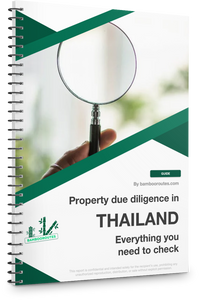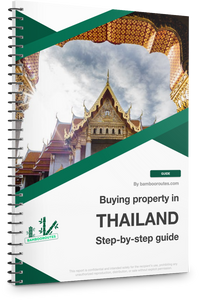Authored by the expert who managed and guided the team behind the Thailand Property Pack

Yes, the analysis of Bangkok's property market is included in our pack
Thinking about investing in Bangkok's vibrant real estate market? You're not alone. With its dynamic culture and booming economy, Bangkok is a hotspot for property buyers.
But what legal hurdles might you face? Are there specific regulations you need to be aware of? How can you ensure a smooth transaction?
In this article, we'll break down the legal requirements you need to know before buying property in Bangkok.
Actually, we know this market inside and out. We keep tabs on it regularly, and all our discoveries are reflected in the most recent version of the Thailand Property Pack
Legal Requirements for Buying Property in Bangkok
When purchasing property in Bangkok, there are several legal requirements and considerations that must be taken into account. Below is a detailed table outlining these requirements, including eligibility, documentation, and financial considerations.
| Requirement | Details | Considerations |
|---|---|---|
| Eligibility for Foreigners | Foreigners can own up to 49% of the total area of all units in a condominium building. | Ownership of land is generally restricted for foreigners. |
| Title Deed Verification | Ensure the title deed is legitimate and check for any encumbrances or liens. | Engage a lawyer to conduct due diligence. |
| Financial Requirements | Funds for the purchase must be transferred from abroad in foreign currency. | Obtain a Foreign Exchange Transaction Form from the bank. |
| Legal Representation | Hiring a local lawyer is recommended to navigate the legal process. | Legal fees vary; ensure the lawyer is reputable. |
| Sales and Purchase Agreement | A formal agreement outlining the terms of the sale must be drafted and signed. | Review the agreement carefully before signing. |
| Transfer of Ownership | Ownership transfer must be registered at the Land Department. | Transfer fees and taxes apply. |
| Taxes and Fees | Includes transfer fee, specific business tax, and stamp duty. | Costs are typically shared between buyer and seller. |
| Condominium Juristic Person | Approval from the condominium juristic person may be required. | Check the condominium's rules and regulations. |
| Bank Loan (if applicable) | Foreigners may face restrictions in obtaining local financing. | Consider financing options from banks in your home country. |
| Property Inspection | Conduct a thorough inspection of the property before purchase. | Identify any potential issues or repairs needed. |
| Insurance | Consider purchasing property insurance for protection against unforeseen events. | Evaluate different insurance providers and coverage options. |
| Residency Status | Owning property does not grant residency rights in Thailand. | Explore visa options if planning to reside long-term. |
Get the full checklist for your due diligence in Thailand
Don't repeat the same mistakes others have made before you. Make sure everything is in order before signing your sales contract.

What You Need to Know Before Buying Property in Bangkok
Can foreigners legally own land in Bangkok?
Foreigners are not allowed to own land in Thailand, including Bangkok, under Thai law.
However, they can own buildings or structures on the land, such as a condominium unit, provided that foreign ownership in the building does not exceed 49% of the total area.
Alternatively, foreigners can lease land for up to 30 years with an option to renew.
What is the process for a foreigner to buy a condominium in Bangkok?
Foreigners can purchase a condominium in Bangkok by transferring funds from abroad in foreign currency and obtaining a Foreign Exchange Transaction Form from the bank.
The condominium must be registered under the Condominium Act, and foreign ownership must not exceed 49% of the total floor area of the building.
Once the purchase is complete, the buyer must register the transfer of ownership at the Land Department.
Want to explore this further?
Are there any taxes or fees associated with buying property in Bangkok?
When buying property in Bangkok, buyers are subject to a transfer fee of 2% of the appraised value of the property.
Additionally, there is a specific business tax of 3.3% if the property is sold within five years of purchase, unless exempted.
Stamp duty of 0.5% is also applicable if the specific business tax is not paid.
What are the financing options available for foreigners buying property in Bangkok?
Foreigners can obtain financing from certain Thai banks, but the options are limited and often require a significant down payment.
Some international banks with branches in Thailand may offer mortgage services to foreigners.
It is advisable to consult with a financial advisor to explore all available options and requirements.
What is the minimum investment required for a foreigner to buy a property in Bangkok?
There is no minimum investment requirement for foreigners buying a condominium in Bangkok, but the purchase must comply with the Condominium Act.
For those seeking a long-term lease, the investment amount can vary based on the location and size of the property.
It is important to consider additional costs such as taxes, legal fees, and maintenance when budgeting for a property purchase.
Buying real estate in Thailand can be risky
An increasing number of foreign investors are showing interest in Thailand. However, 90% of them will make mistakes. Avoid the pitfalls with our comprehensive guide.

What are the legal requirements for transferring money to Thailand for property purchase?
Funds must be transferred in foreign currency and converted into Thai Baht by a Thai bank to obtain a Foreign Exchange Transaction Form.
This form is necessary to register the property under a foreigner's name and to repatriate funds in the future.
It is crucial to ensure that the transfer is correctly documented to avoid any legal issues.
How long does the property transfer process typically take in Bangkok?
The property transfer process in Bangkok can take anywhere from 30 to 60 days, depending on the complexity of the transaction.
This includes due diligence, contract signing, and registration at the Land Department.
Engaging a local lawyer can help expedite the process and ensure compliance with all legal requirements.
What are the common legal pitfalls to avoid when buying property in Bangkok?
One common pitfall is not verifying the legal title and ownership of the property, which can lead to disputes.
Another issue is failing to understand the terms of the lease or ownership structure, especially for foreigners.
It is advisable to conduct thorough due diligence and consult with a legal expert to avoid these pitfalls.
Want to explore this further?
Is it necessary to hire a lawyer when purchasing property in Bangkok?
While it is not legally required to hire a lawyer, it is highly recommended to ensure that all legal aspects are properly handled.
A lawyer can assist with due diligence, contract review, and compliance with Thai property laws.
Having legal representation can provide peace of mind and protect your investment.
What is the role of the Land Department in property transactions in Bangkok?
The Land Department is responsible for registering property transactions and ensuring that all legal requirements are met.
They maintain records of property ownership and handle the transfer of titles between parties.
It is essential to register the property transfer with the Land Department to secure legal ownership.
Are there any restrictions on renting out a property owned by a foreigner in Bangkok?
Foreigners can rent out their property in Bangkok, but they must comply with local rental laws and regulations.
It is important to declare rental income and pay the applicable taxes to avoid legal issues.
Engaging a property management company can help manage the rental process and ensure compliance.
What are the ongoing costs associated with owning property in Bangkok?
Ongoing costs include property taxes, maintenance fees, and utility bills, which can vary based on the property's location and size.
Condominium owners may also be required to pay monthly common area fees for building maintenance and amenities.
It is important to budget for these expenses to ensure the property's upkeep and compliance with local regulations.
